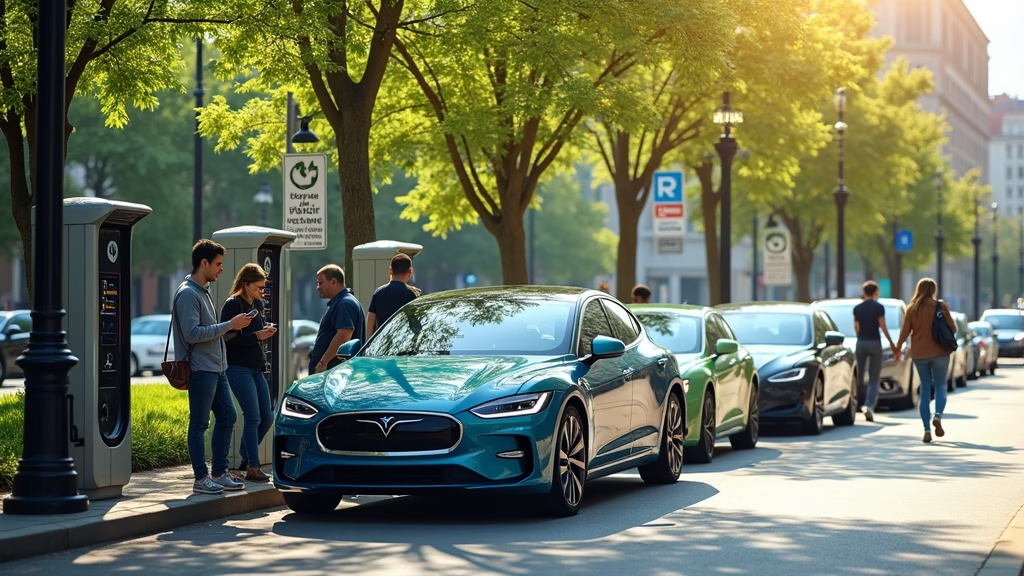Why Electric Cars Beat Hydrogen for Green Transport
Why Battery Electric Vehicles Outperform Hydrogen Vehicles
Ladies and gentlemen, as we stand at the crossroads of climate crisis and environmental degradation, the transportation sector’s transformation has never been more vital. Among the most hotly debated topics are the merits of battery electric vehicles (BEVs) compared to hydrogen-powered ones. A prominent study from Stanford University reveals striking evidence that BEVs outpace their hydrogen counterparts across numerous critical metrics, particularly in reducing greenhouse gas emissions. This exploration delves into the fundamental differences between these technologies, unearthing the reasons why battery electric vehicles are often deemed superior to hydrogen vehicles.
Evaluating Energy Efficiency and Cost
At the heart of the discussion lies the energy efficiency and overall cost of ownership. Battery electric vehicles offer lower operational costs in comparison to hydrogen-powered vehicles, a finding substantiated by the Stanford study. This can largely be attributed to the inherent energy efficiency of electric vehicles, which utilize the majority of the energy they receive during charging for propulsion. In stark contrast, hydrogen vehicles suffer from a significant energy loss during the production and distribution of hydrogen fuel.
Energy Efficiency: A Key Player
Battery electric vehicles, with their impressive energy efficiency, can convert approximately 60% of the electrical energy from the grid to power at the wheels, whereas hydrogen vehicles typically convert only about 20% of the energy from hydrogen into usable power. This stark comparison highlights a paradigm whereby BEVs boast not only better performance but also greatly diminished operational expenses due to their simpler architecture and production requirements.
Environmental Impact and Production Process
The dichotomy of environmental impact remains a crucial point in the BEV versus hydrogen vehicle discourse. While battery electric vehicles generate zero emissions during operation, their production processes are not without consequences. The manufacturing of batteries involves emissions linked to the extraction and processing of materials such as lithium and nickel. Nevertheless, when juxtaposed with hydrogen vehicle production—which requires vast amounts of energy for hydrogen generation—the cumulative environmental footprint of BEVs remains significantly lower.
Recycling Challenges and Technological Innovations
One of the persistent challenges concerning battery electric vehicles is the issue of recycling. Eventually, every battery reaches the end of its life cycle, necessitating proper recycling techniques to mitigate environmental risks. Present innovations strive toward developing recycling technologies that not only ease the ecological burden but also facilitate the reuse of materials in new batteries. With aspirations for a circular economy, the future might look brighter for the waste management of electric vehicles.
Disparities Between Production and Usage
The contrast in the production and operational frameworks of battery electric vehicles and hydrogen-powered vehicles is stark. Battery vehicles draw from the pre-existing electrical grid, a convenience that champions their widespread adoption. Conversely, hydrogen vehicles require specialized refueling stations that necessitate significant financial investment and logistical coordination. This fundamental difference places BEVs in a more favorable light, rendering them more economically viable and accessible.
Infrastructure and Economic Considerations
As we dissect the landscape of transportation alternatives, the infrastructure supporting these vehicles cannot be overlooked. Battery electric vehicles utilize existing electrical networks, making them easier to adopt and integrate into everyday life. On the other hand, hydrogen vehicles demand an intricate network of refueling stations, exponentially increasing the complexities and costs associated with their implementation. The implications of such economic realities are undeniable, driving consumers towards the burgeoning market of battery electric vehicles.
Environmental Considerations in Production
Every transportation option leaves a mark on our environment. The materials involved in battery production inevitably raise concerns about their extraction processes. Mining practices for metals like lithium and nickel pose significant ecological risks which cannot be ignored. Yet, as we analyze their life cycle, it becomes evident that the operational advantages during their usage period ultimately favor battery electric vehicles by far.
Recycling and Disposal
The question of recycling and disposing of batteries represents a pivotal area of concern in the electric vehicle narrative. Currently, advanced research seeks innovative solutions that could not only lower environmental impacts but also allow for material recovery to supply future battery manufacturing processes. As these prospects unfold, the conversation surrounding battery electric vehicles continues to evolve.
Future Insights and Development Trends
Looking ahead, the trajectory for battery electric vehicles points towards accelerated growth. With their energy efficiency and lower per-mile costs consistently outpacing hydrogen vehicles, technological improvements will only serve to enhance their appeal further. As advancements in infrastructure, battery technology, and production methods gain momentum, the attractiveness of BEVs as a sustainable transport solution will only strengthen.
In our ever-changing dialogue about energy solutions, electric vehicles emerge as the frontrunners, afforded both governmental and public support, standing poised to reshape our transportation landscape. They represent a path towards a cleaner, more sustainable future, affirming their status as the quintessential emblem of modern mobility.
For constant updates, check our Telegram channel for always fresh news that includes the latest in technology and transportation trends.
Challenges of Hydrogen Vehicles
Despite the potential hydrogen vehicles boast, they face several challenges that hinder their widespread adoption. The process of generating hydrogen fuel typically involves significant energy input, often derived from fossil fuels, which ironically undermines their environmental benefits. Moreover, the complex infrastructure required for hydrogen distribution remains a major barrier, often limiting their availability to urban centers and leaving rural communities untouched.
Investment and Economic Viability
Investment in hydrogen infrastructure comes with substantial economic risks. Governments and private enterprises alike must weigh these costs against the tangible benefits that battery electric vehicles have already proven. As society becomes increasingly conscious of the urgency of climate change, there exists a growing preference for solutions that showcase an immediate environmental impact. This shifting landscape amplifies the appeal of battery electric vehicles, which offer a clearer, more direct path towards sustainable transportation.
Comparative Lifecycle Emissions
Analyzing the lifecycle emissions of battery electric vehicles and hydrogen vehicles provides additional clarity in this ongoing debate. A comprehensive examination by Stanford University indicates that BEVs significantly reduce overall greenhouse gas emissions in comparison to their hydrogen counterparts. The energy loss inherent in hydrogen’s production and distribution channels results in a scenario where, despite their zero tailpipe emissions, hydrogen vehicles may end up with a higher total carbon footprint over time. This leads us to reevaluate the purported benefits of hydrogen technology against the already established advantages of battery vehicles.
Regulatory and Social Acceptance
Regulatory frameworks also play a critical role in shaping the acceptance of transportation technologies. Governments worldwide are progressively creating policies that incentivize the adoption of battery electric vehicles, from tax rebates to infrastructure investment plans designed to support widespread charging accessibility. As public awareness about electric vehicles grows, the societal shift towards favoring BEVs becomes even more pronounced, further solidifying their position as the transport solution of choice for environmentally conscious consumers.
Potential for Technological Advancements
With continuous advancements in battery technology, the gap between the capabilities of BEVs and hydrogen vehicles is only set to widen. Innovations in battery chemistry, reductions in charging times, and enhancements in energy density promise to improve the performance and affordability of BEVs. Furthermore, as the world pivots toward sustainable energy sources, battery manufacturing methods related to renewables could lead to even cleaner production processes in the future.
The Auxiliary Role of Hydrogen
While hydrogen vehicles struggle to find their footing within the current transportation landscape, they may yet serve a complementary role to battery electric vehicles. In specific applications—such as heavy-duty transportation, shipping, and long-haul logistics—hydrogen could provide solutions where battery technologies face challenges in energy density and weight. This nuance indicates that rather than framing the discussion solely as a rivalry, a more collaborative exploration of how both technologies might serve society could yield beneficial results for all stakeholders.
Conclusion: The Path Forward
As we reflect on the evolving narrative of battery electric vehicles versus hydrogen vehicles, it becomes evident that the scales tip in favor of the former for several compelling reasons. Battery electric vehicles offer unmatched energy efficiency, lower total emissions, and a rapidly expanding infrastructure that promises access for all consumers. Though hydrogen technology presents intriguing possibilities, its current limitations raise questions about its viability in the near term. As we forge ahead in pursuit of a sustainable transportation future, prioritizing innovations that directly address our pressing environmental challenges will be paramount.
For further examination of issues related to transportation choices and their implications on our planet, please refer to Stanford University’s comprehensive findings.
Stay updated on ongoing discussions and advancements in this vital aspect of our lives by following our Telegram channel for always fresh news related to global developments.
latest video
news via inbox
Subscribe to the latest news in the world of politics and technology







